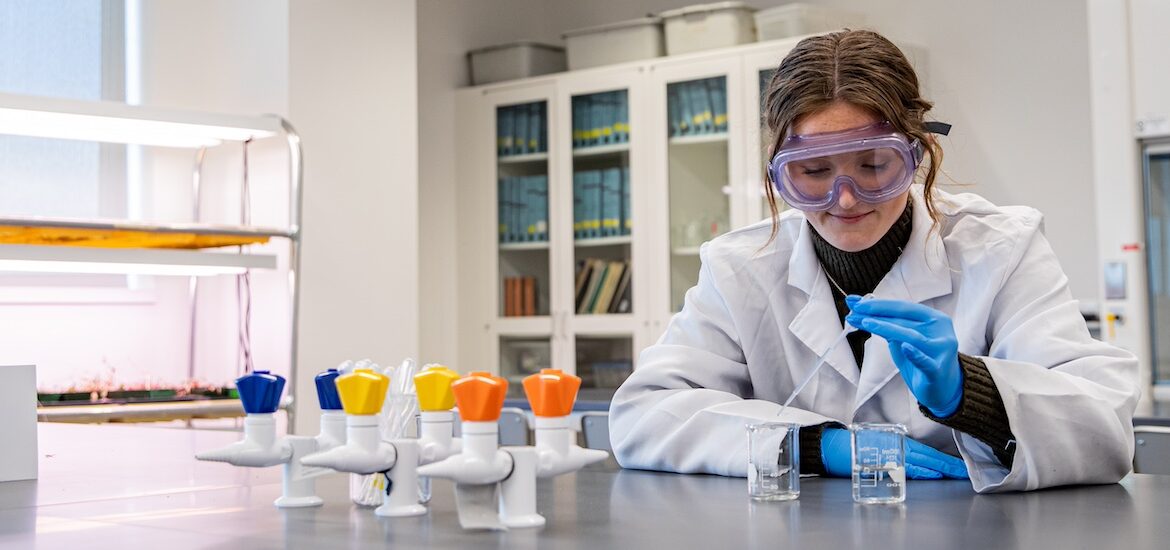Information That Aspiring Molecular and Cellular Biology Majors Need To Know
In simple terms, molecular and cellular biology is the study of how living things work at the smallest levels. It dives deep into the inner workings of cells, the molecules they’re made of, and how those molecules interact to keep us healthy—or sometimes, make us sick.
If you’ve ever heard of DNA, proteins, or cellular structures like mitochondria and ribosomes, you’re already a little familiar with the world of MCB. This field focuses on how these components are built, how they communicate, and how they respond to changes inside the body or in the environment.
It’s the science behind breakthroughs in medicine, genetics, and biotechnology—everything from gene editing with CRISPR to the development of new vaccines.
Our students’ voices and experiences speak for themselves – hear what they have to say about being an MCB major at Rowan University.
What Do Molecular and Cellular Biologists Do?
Molecular and cellular biologists spend their time asking—and answering—some of the most important questions in science and medicine. What causes cells to malfunction? How do viruses invade our bodies? How can we turn off harmful genes or repair damaged tissues?
In practice, this means working with high-tech lab equipment, analyzing genetic sequences, culturing cells, and performing experiments that uncover how life works at the molecular level. These scientists might:
- Study how cancer cells grow and spread
- Develop vaccines and new medications
- Research genetic disorders and potential treatments
- Investigate how cells communicate and heal
- Explore stem cells, regenerative medicine, and cell therapy
- Help create biotech products like insulin or biofuels
Whether in hospitals, biotech companies, pharmaceutical labs, or universities, molecular and cellular biologists play a critical role in advancing human health and understanding life itself.
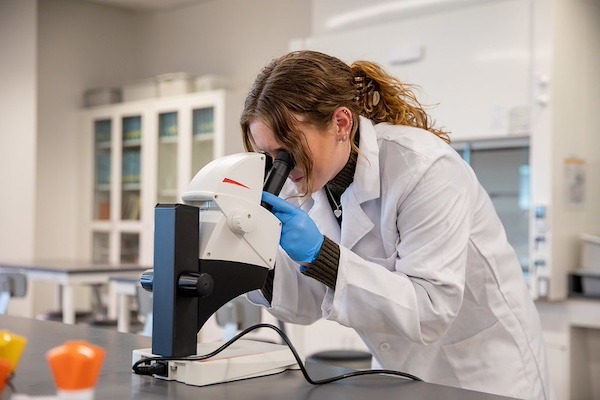
What Can You Do with a Molecular and Cellular Biology Degree?
Graduates with an MCB degree have a lot of options. Many choose to work in healthcare, biotechnology, or pharmaceuticals, while others continue on to graduate or professional programs in medicine, veterinary science or dentistry.
Here are just a few career paths you could take with this degree:
- Research Scientist – Conduct experiments to explore disease mechanisms, drug development or gene therapies.
- Biotech/Pharmaceutical Lab Technician – Work in product development, quality control or regulatory compliance.
- Clinical Research Coordinator – Manage clinical trials that test new treatments or medications.
- Forensic Scientist – Use biological evidence to help solve crimes.
- Genetic Counselor – Work with families to understand inherited conditions (additional grad study often required).
- Science Communicator – Translate complex research into content for healthcare organizations, education platforms or media outlets.
Many students also use this degree as a stepping stone to medical, dental or veterinary school, thanks to its strong foundation in anatomy, genetics and disease biology.
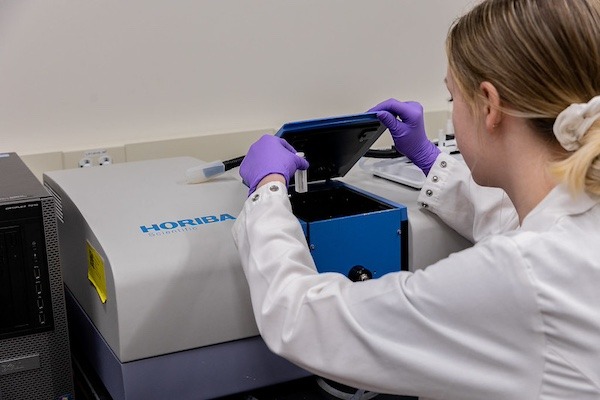
What Does a Molecular and Cellular Biology Major Learn?
The coursework in this major integrates essential topics like genetics, biochemistry and microbiology with innovative fields such as biotechnology and molecular medicine, giving students a well-rounded, cutting-edge education in the life sciences.
Upper-level elective and required courses within the Molecular and Cellular Biology major include classes such as:
- Molecular Genetics
- Cell Biology
- Biochemistry
- Medical Microbiology
- Genomics and Bioinformatics
- Developmental Biology
- Molecular Biology Techniques
- Biology of Cancer
- Virology
- Neuroscience
- Physiology
- Stem Cells and Regenerative Biology
- Molecular Basis of Disease
- Advanced Cell Biology
- Research in Molecular and Cellular Biology
This blend of foundational and specialized courses prepares students for a wide range of career paths in healthcare, research, biotechnology, and graduate or professional programs. Rowan’s emphasis on both theoretical understanding and hands-on laboratory experience ensures students graduate ready to contribute to fields ranging from gene therapy to disease research and pharmaceutical development.
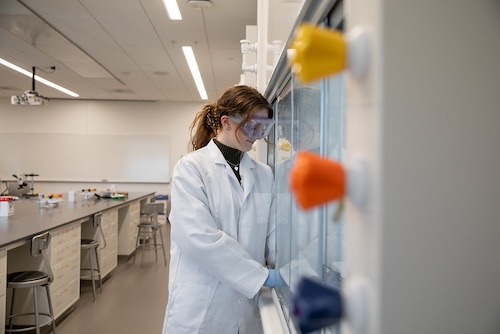
Why Rowan?
At Rowan University, our Molecular and Cellular Biology program combines a rigorous academic curriculum with hands-on learning experiences that prepare students for today’s fast-moving life sciences industry. But what really makes Rowan stand out is its tight-knit community and access to real research opportunities even as an undergrad.
From working with cutting-edge technology such as CRISPR gene editing and high-throughput sequencing to studying infectious diseases and cancer biology, students here aren’t just learning about breakthroughs—they’re part of them.
Rowan’s collaborative research labs and opportunities to co-author published studies give students valuable, real-world experience. Our course offerings cover everything from molecular genetics to regenerative medicine, and students have access to faculty mentors who genuinely care about helping them succeed.
Plus, with student organizations like the Biology Club and opportunities for internships and on-campus research assistantships, it’s easy to get involved, build connections, and start shaping your future in science.
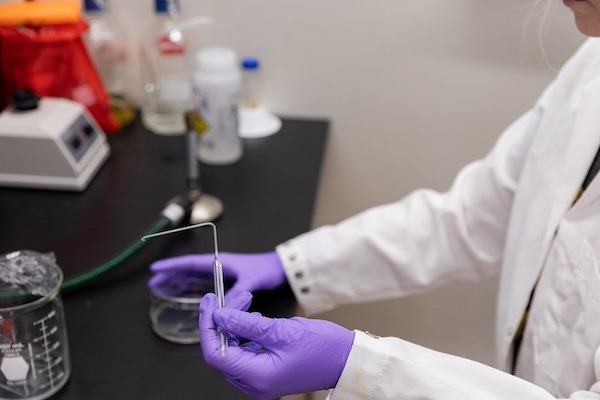
Molecular & Cellular Biology Alumni Highlights
Aaron Agostini
Aaron earned his bachelor’s in molecular and cellular biology two years ago, and is now enrolled at The University of Melbourne as a Ph.D. candidate studying biosciences. As an undergraduate student Aaron conducted research in the Carone Laboratory, studying the role of CTCF expression in developing human cell lines. While on campus he also contributed to Avant magazine, and participated in the College of Science & Mathematics Research Day as well as Wistar Trainee Research Symposium. He studied abroad in India over winter break with the College of Education, and also served as a QA microbiologist assisting the local brewery, Bonesaw Brewing.
Tajrian Khan
Graduating one year ago, Tajrian is enrolled in a master’s program in biological sciences at Virginia Tech. As an undergraduate research fellow he completed two projects:
- The Effects of Hydrophobic Ion-Paired Fluoroquinolones on Bacterial Biofilms
- Low-Cost Platform to Assay Bacterial Biofilm Formation in Flow
In addition, Tajrian also held the distinction of being a URISE Research Fellow through the National Institutes of Health.
Kali Pierson
Kali is enrolled as a PhD candidate in Cancer Biology, at Philadelphia College of Osteopathic Medicine (PCOM) partnered with The Wistar Institute. As an undergraduate she also held a URISE Research Fellowship, working in Dr. Nathaniel Nucci’s molecular biophysics lab, studying the structural characterization of various proteins through several spectroscopic techniques. She led independent projects and worked on several team-based projects, and presented research projects at various internal and external conferences.
Final Thoughts
If you’re fascinated by the science behind how our bodies work, passionate about helping others through research, or eager to be part of groundbreaking discoveries in health and medicine, molecular and cellular biology could be the perfect major for you.

